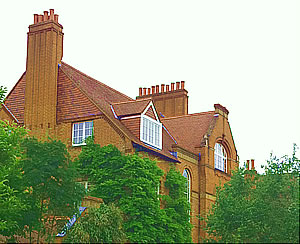How Bedford Park was saved from the developers - and why
|
Fifty years ago, in 1963, the Bedford Park Society was set up to fight council planners who were knocking down some of the finest houses in what John Betjeman called "probably the most significant suburb in the Western world".
The Society's founders persuaded Betjeman to be its patron and launched what they called 'A Betjeman broadside in defence of Bedford Park'. (See cutting attached).
Their breakthrough came in 1967 with the first Bedford Park Festival, launched by the new vicar of St Michael & All Angels church to raise funds for repairs and to build community spirit. In the Vicarage, the Society put on an exhibition on the Art and Architecture of Bedford Park. It was visited by Betjeman and an inspector from the Ministry of Housing. Within weeks, 356 of the houses had been given 'listed building' status and Bedford Park was saved.
Since then the Bedford Park Society has won other victories – and the ‘first garden suburb' has become one of the most-sought-after residential areas of London.
But why is it thought to be so special – and what should be done to keep it so?
Tonight's Festival event, The Fall & Rise of Bedford Park, will celebrate the achievements of those architectural and heritage pioneers and discuss how the area can and should be preserved over the next 50 years.
In Part One, poet Cahal Dallat describes the early days of Bedford Park as an artistic and literary colony; local architect John Scott explains the significance of its archtecture; and actor John Rowe discusses John Betjeman's contribution, with readings from Bevis Hillier's biography of Betjeman.
After the interval, in Part Two, Torin Douglas leads a discussion on the role of the Bedford Park Society, with its president Nigel Woolner, who will describe some of the Society's other battles and achievements.
The discussion will also raise the concerns of the Society's criticis. Is it too restrictive in what it demands of residents? Is there a role for a separate Bedford Park residents' association? And what should the Society do in the next 50 years to stay relevant in the 21 st century?
All contributions from the floor are welcome! Tickets are £7.50 at the door or from www.bedfordparkfestival.org
June 10, 2013
